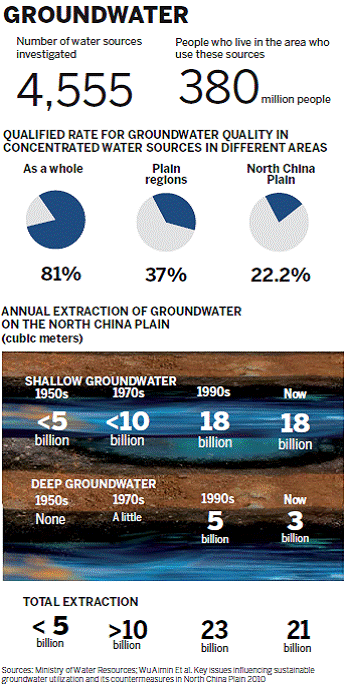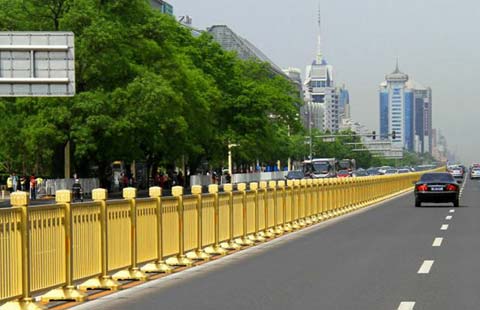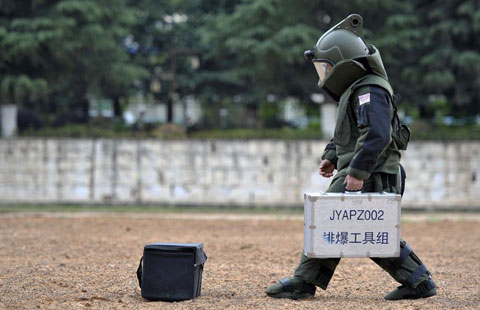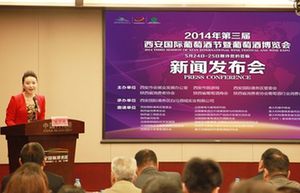A growing thirst for water safety
By Wu Wencong, Jiang Xueqing and Tang Yue ( China Daily ) Updated: 2013-06-28 07:51:01
Harsher punishments
On June 18, China's top court and procuratorate issued a joint interpretation of the conviction and sentencing standards for criminal cases involving environmental pollution. Under the interpretation, the underground dumping of waste was deemed one of the 14 most serious environmental-pollution offenses with conviction resulting in prison sentences as long as seven years.
Before the interpretation came into effect on June 19, the pollution of surface water was hardly ever regarded as a criminal act, meaning unseen pollution underground was rarely tackled. Punishment was light, too, and in most cases the perpetrators were simply fined.
On May 9, the Environmental Protection Ministry revealed the results of a 40-day investigation into groundwater pollution in six provinces in North China. The ministry advised that 88 out of the nearly 26,000 companies investigated should be fined, but the average fine imposed was less than 70,000 yuan ($11,000).
The only instance of harsher punishment most experts could recall occurred in Yancheng city, Jiangsu province, in 2009. A chemical plant dumped wastewater into a river, polluting the source of drinking water. Supplies to more than 200,000 people were suspended for 66 hours.
The company was accused of "spreading poison" and the two people held responsible for the incident received sentences of 11 years and six years.
Legal experts have been unable to reach a consensus over the sentences handed down in the case, but most agreed that the heavy sentences illustrated the government's determination to impose severe punishments on those convicted of causing polluting, and highlighted its desire to protect the environment.
"The penalty was a little heavy in that case, but the new interpretation issued by the top court and procuratorate indicated the government's resolve to tackle the problem," said Ma Yong, director of the supervision and litigation department at the environmental legal service center of the All-China Environmental Federation.
Outdated standards
Although the laws on the pollution of groundwater are being used to greater effect, many experts and officials are concerned about the outdated quality standards for groundwater.
The 2002 standard outlines a checklist of 109 items to evaluate the quality of surface water used as a source of drinking water, adding 40 items to the version released in 1999.
However, the current quality standard for groundwater, issued in 1993, has just 39 items on its checklist.
More than 400 out of China's 660-plus cities obtain their drinking water from groundwater sources, according to statistics released by the Water Resources Ministry, and Chen Ming believes the number of items of the checklist for groundwater drinking sources should be the same as that for surface water.
Ling Jiang, deputy head of the department of pollution prevention and control from the Environmental Protection Ministry, agreed with Chen's suggestion.
"The current number of items is only effective if the area or source hasn't been polluted, but the number of pollutants in the composition of groundwater is already too great and 39 items can't determine the quality accurately," said Ling.
He said the ministry's science, technology and standards department is working on a new version of the quality standard for groundwater, but the issue is still at the expert-discussion stage and far from being implemented.
Contact the writer at wuwencong@chinadaily.com.cn
|
|
|
|
|
|
|
|


















 Op Rana
Op Rana Berlin Fang
Berlin Fang Zhu Yuan
Zhu Yuan Huang Xiangyang
Huang Xiangyang Chen Weihua
Chen Weihua Liu Shinan
Liu Shinan